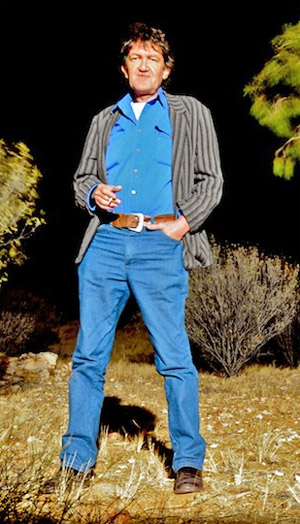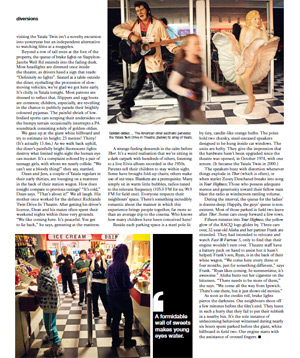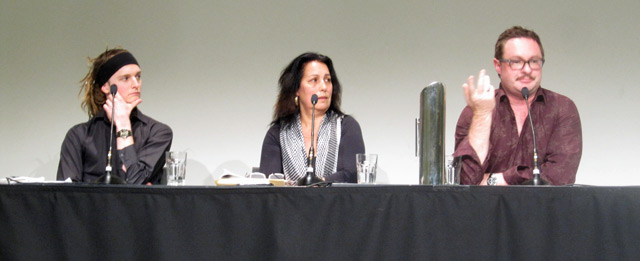This is a three-way live radio interview conducted by Sky Kirkham, Amy Stevenson, and Alexander Atkinson, the co-hosts of the4ZzZ Book Club, on Thursday 26 May 2011. 4ZzZ is a community radio station in Brisbane.
Our half-hour interview concerned National Young Writers’ Month 2011, my freelance journalism, and my role as co-organiser of UnConvention Brisbane 2011. Their questions are bolded.
If, for some crazy reason, you’d rather listen to the audio of this interview than read the transcript, you can do that here.

Welcome Andrew, and thank you for joining us today.
Thank you.
Andrew is the Queensland ambassador for National Young Writers’ Month. So I suppose to start off, tell us about National Young Writers’ Month.
Sure, National Young Writers’ Month starts next month, funnily enough. So I’ve been organising some events here in Brisbane and up in my home town of Bundaberg in anticipation of next month, to get young people inspired about writing and to start thinking about setting some goals to work towards during the month of June.
I’s really about getting young people talking about writing, and helping them work towards those goals by building a little community around young writers across the country.
How is the event doing that?
It’s online-based, and there’s a website which Express Media have organised. National Young Writers’ Month is promoted by Express Media, who are a Victoria-based arts company. The website is expressmedia.org.au/nywm.
We will put a link to that from our Facebook page at the end of the show. How did you get involved in National Young Writers’ Month?
The coordinator of the event came across my work somehow, I don’t know, through a search engine or something. And she liked what I was doing, so she asked me to be involved because she could see that I was under 25,and the event is targeted towards under 25s. She could see that I’d done a fair few interviews with writers in the past, and hoped that could translate through to helping other people be inspired enough to start writing.
Is there any particular reason for the age 25 limits on it? It seems almost arbitrary.
It does seem arbitrary, doesn’t it? It’s not my decision. I couldn’t answer that question.
I guess you have to cut ‘youth’ off somewhere.
What kind of goals are people going to be setting? Are these all manner of writing, or is it non-fiction and fiction?
It’s all manner of writing. Of the national ambassadors, I’m the only journalist. The rest of the ambassadors are fiction writers, poets, and that kind of thing. So it’s for any kind of writing, whether you want to start a book or get a few chapters down during the month, or start a blog and write every day, or even just write yourself a diary entry every day. It’s just to get the juices flowing.
Whatever achievable goal you think you can do in a month.
Yeah. It’s about making it an achievable goal, too, so not like “I’m going to write a book in a month!” because you’d probably tear your hair out in frustration.
I’m sure some people try.
Are there any physical workshops coming up? I know you’ve just run a couple of seminars or conversations with local authors.
I don’t have anything else planned. In the last 10 days or so I’ve done three events; two here in Brisbane, and one in my hometown of Bundaberg. Last Tuesday I had Benjamin Law and John Birmingham talking about freelance journalism – which is what I do, and what they are both well-known for doing. And this Tuesday just past, I had the Courier Mail’s Qweekend magazine staff talking about feature journalism, which I think was pretty cool because that magazine is regarded as being the best journalism in Queensland. Certainly among the best in Australia too.
So that was Trent Dalton —
Matthew Condon, and Amanda Watt.
Who was your favourite interview?
On stage, you mean?
Yeah.
Andrew: Matthew Condon, because… actually, it’d be a tie between him and John Birmingham, because they both have the rare distinction of being writers who speak as well as they write. Most writers… myself definitely included; I don’t speak as well as I write, because I like to have that time to get my mind focused. But somehow, JB and Matthew Condon have that ability to form whole sentences and witty comments on the fly.
Makes you wonder if their writing comes out that way in one smooth, flowing, fully-formed script.
Yeah.
Yes, we try to do that on the 4ZzZ Book Club. We don’t always succeed. [laughs]
To take a step back; you’re saying you are a freelance journalist. How did you get into that industry in the first place? What was it that drew you to it, and what was your first step in getting involved, as advice to all of our young writers out there who might be interested.
I started… I guess the first time I was published was in mid-2007 and for a couple of years following that, all I did was review live shows here in Brisbane for Rave Magazine and for FasterLouder. So for those two years, it was just purely live reviewing, the occasional CD review. That was my ‘journalism’ for two years, and I was happy to leave it at that was because it was a fun little pastime for me. It meant I got free concert tickets and I could go to see shows that I otherwise would pay for.
So that was cool, but at the same time it gave me the ability to work towards deadlines, and to word counts, and to be concise and to the point. So that was a hobby. I graduated from uni with a Bachelor of Communication in mid 2009. I didn’t really intend to do anything with journalism, but around that time I quit my job in web design, and I was kind of at a crossroads where I could decide to either pursue another full-time offie job or try something else that I knew; which, in that case, was freelance journalism fulltime. So I decided to put my mind to that. And it took many months, in financial terms, before I saw the fruits of that effort, but over those last two or so years, I think I’ve kind of got on top of it.
Is it possible to earn a living from freelance journalism?
It is, but you have to be incredibly dedicated and persistent. You have to get up every day and market yourself to editors, and have ideas, and constantly be thinking weeks or months ahead in terms of publication schedules, and what’s going to be current a few months down the track.
What would you describe as maybe the thrills and perils of freelance journalism?
The thrill is… for the year or so I was working an office job, the morning commute is quite upsetting. You have to get up early, make your lunch, catch a bus or train in… That gets old pretty quickly, as I’m sure everyone can appreciate in some regard. [Andrew’s note: I didn’t get to finish saying it, but the ‘thrill’ I was referring to was setting my own hours, and working from home…]
I suppose in those earlier days you would have been working to finance yourself some other way, as well.
That’s true. I did a bit of copywriting and web account management for a friend’s business, but in the last year or so I’ve given that up and I’ve just been freelance writing full-time. The thrills… and what was the other part?
Perils.
Perils. Well, it comes down to finance, I suppose. I mean, like I said; you have to be marketing yourself every day, and if you’re not doing that, then you’re not getting paid, and you can’t pay your rent or feed yourself.
And become yet another impoverished writer.
Exactly. I didn’t want to become a cliché, which is why I’ve been successful. [laughs]
Or living the stereotype. Is it all about generating a portfolio? Is that how you tend to market yourself once you have volunteered [as a writer] and you’ve got stuff that you haven’t been paid for, and people can see you’re good at what you do, then you can take your portfolio further?
In a way, yes. Those two years when – I was doing the stuff for the street press and FasterLouder – was essentially unpaid. But at the same time, I didn’t expect to get paid, because it was fun for me; free tickets and all that. But after I quit that job and made the distinction that I wanted to be a writer full-time, then I only pursued paying publications. I did that doggedly, for months on end, before I really saw the return.
That’s how you have to think; months down the track, instead of on a day-to-day basis, because you can do excellent work and people can like your work across Australia or across the world, but you don’t see the invoice until a few weeks or months down the track.
We are talking to Andrew McMillen on the Book Club here tonight on 4ZzZ. Andrew, what was your first paid journalism article?
I interviewed the Brisbane band Screamfeeder for a website called messandnoise.com. It was funny, because I’d been doing – in some ways – music journalism for a couple of years, but I’d never actually interviewed a band. So in anticipation of that I bought a little recorder, and I did all my research and preparation and took notes, and all that sort of thing.
It went really well, and it was published online, and it was worth $60 or something like that. It was a breakthrough for me because it was like, “holy shit”; here’s this article which I put a lot of effort into and I could see the results, and it was well received among the [online] community and all that sort of thing. And that first paying success, as it were, I still feel that to this day when I get published in The Weekend Australian or Rolling Stone.
I mean, obviously I’m a full-time writer. I like to get paid for my work, but it’s also still a thrill to see my name in print and to see people responding to an article, whether through comments on an article or on Twitter or Facebook; that sort of thing.
You’re saying how you write full-time. What was the draw of journalism in particular? Did you ever have any aspirations of pursuing other writing activities?
No, I didn’t. Now that you asked that, I’m not really sure. I’m curious. I guess I’m naturally curious, and the role of the journalist, I think, is to remove curiosity from day-to-day life. A good journalist is asking the questions that you want to know, and putting them into articles or radio programs or TV shows that are answering those questions. I guess I like being rooted in non-fiction, because it’s where I live on a day-to-day basis, rather than being lost in my head with fictional characters.
I suppose in journalism as well, you get to come out of your hidey-hole and interview people.
Yes.
Actually have contact with people.
Exactly, because I know from experience you can spend enough time in your bedroom, or your workspace, and it’s days before you actually go out and see someone. So it’s always a thrill to be out and to meet people, definitely.
As one of the challenges of freelance journalism, you’re talking about the need to market yourself constantly, and to look ahead. Is there this trade-off where, I suppose, you would have some freedom as a freelance journo that you wouldn’t otherwise, that you have to work almost as hard at the marketing side as you do at actually writing your articles?
Definitely, that’s the balance. It’s great to be able to roll out of bed at midday, or stay up late and not have to worry about getting up for work, or whatever, but in terms of why I have been successful is because, from the beginning, when I had that first paying article, I started uploading all of my articles to my own blog, which is andrewmcmillen.com. Every time I would introduce myself to another editor, I would show them my blog and show them my three best articles up to that point.
I’m not sure, because none of my editors have ever said it, but I think that taking that kind of time to build a web presence and keep it updated, and take pride in that; I would hope that has swayed them in some ways to think, “Okay, this guy’s serious about what he does.”
Interviewer 1: You see that with authors and websites as well. There are some authors who have the most fantastic websites and then you have ones which look as though they haven’t been touched for years, and are atrociously formatted. You have to wonder whether they’re actually interested in booking themselves up, because they’re obviously not committed to it.
Interviewer 2: That comes back to the balance again, I guess, of authors who feel they shouldn’t have to do anything other than write. I believe we’ve heard even people on this show talk about that, but definitely I’ve heard other interviews with authors feeling quite indignant that they have to do something other than —
Interviewer 1: “What? I have to market myself?”
Interviewer 2: Exactly.
Interviewer 1:: “Don’t people get paid to do that?”
Interviewer 2: It seems pretty lonely to engage in writing that way, lock yourself up in a little room and just do nothing but write. I think it’s a skill that probably our generation is in grasp of a lot more. We are a generation of bloggers and Facebookers. We have no problem really of announcing our ideas to our community of friends, and taking that on to a larger step as a professional basis. You probably have to be quite good these days, because everyone’s tried their hand at that sort of lifestyle.
I was adept at that kind of social media, or whatever you want to call it, because I’ve grown up with the internet. I’ve been using it hardcore since I was 12, and I don’t see myself stopping.
Didn’t you first start writing on the internet; gaming reviews or something?
Yeah.
See, we’ve done research!
The first time I was published in some way, I suppose, is when I was about 12 or 13, for an online video game community [NINTEN] where I was essentially rewriting press releases. Which is as glamorous as it sounds. But it was cool because I was already a member of this community but it was also helping me to show some talent of mine: that I could write, and that people might want to read about the latest Nintendo game or some other thing that’s coming out. It feels silly to talk about it now, but at the time I loved it because I was passionate about video games, and for years I wanted to be a video game journalist, which I have kind of…
Sounds like a rad job.
Video game journalist?
Yeah; you play the games, you tell people about them. The dream job.
I’ve kind of done some video game journalism, but it’s been nothing to do with playing games; more about looking at the business side of games, which I don’t think many people – either in Australia or in the world – are doing. I got into that because, here in Brisbane a studio called Krome shut down the end of last year. For a week or so, there were rumours floating around that they’d fired all their staff, but no one was confirming it.
Because no one was looking into it I was like, “I’m going to go check it out for myself.” There’s a gaming website called IGN, which I approached the editor of. I said, “Can I do this story for you?” He’s like, “Yeah man, I really want somebody to do it because, like you, I’m curious.”
So I found a bunch of staff who had left the studio recently, and I put together their stories and theories on why the company went out of business. Then I got an interview with the CEO. It was the first time he’d spoken to media since the rumours started, because all the Courier Mail reporters [and the like] and all were calling up to say, “Is this true?!”. They were really confronting him, whereas I came in under the radar and said, “Look, I’ve done this research with some past employees. They’ve told me this; is it true?”
I guess it’s that kind of tenacity that really drives a young journalist. Do you have any writing heroes, or literary heroes that you used as a model for that, or any sort of model for your writing?
Yeah, also around the time I quit that [web design] job, I went down to Sydney to interview my favourite writer, Neil Strauss. He’s an American author who’s best known for writing for Rolling Stone and New York Times for about 20 years, and in 2005 he had a book called The Game: Penetrating the Secret Society of Pickup Artists.
I think I’ve heard of that one.
He had a new book that came out in 2009, and I had an interview lined up with him. He was meant to come to Brisbane for this book tour, but it didn’t come through. He was just going to Sydney and Melbourne instead, because I guess there wasn’t enough media attention up here. So I had resigned myself to just doing a phone interview with him, like any other writer or musician I’ve done before. My friend said, “If this guy means so much to you, why don’t you take a few hundred dollars and take the cost and fly down and see him?” Which I hadn’t considered at all.
So I did that, and I met him. I interviewed him for 45 minutes or so. That was a massive formative experience for me, because here’s this guy who has literally built his life around writing and publishing words. And that made me realise that I can do that; that’s what I wanted to do.
So you’ve clearly gone a few paths as a journalist. You’ve got your musical background and, I guess, more straight stories, things like the current one [‘Krome Studios: Things Fall Apart’]. How do you plan the difference in approaching those, and also, how do the publications you’re dealing with approach your involvement in them as a freelance journalist?
It depends very much on the publication, and what they want from their writers. For example, the majority of music writing I do these days is for a website called TheVine.com.au. And mostly what I do for them is interviews, which are published in a straight Q+A format. So there’s a few hundred word intro and then it’s just the conversation as it happened. Which I’m really big on, because I remember reading street press, before I was writing for it. I would see, “this band’s touring”, or they’ve got an album coming out. There’s this little 300 or 500 word article and there’s a couple of quotes that are plugged in there, but it’s like – “what did the writer and musician talk about for the rest of those 15 minutes?” Because most bands give 15 minute phone interview blocks.
It confused me, because I wanted to see the full story. So both TheVine and Mess+Noise are quite good at publishing full interviews, but that’s, again, because they are web publications, whereas a magazine like Rolling Stone or triple j mag, they’re constrained by space.
I guess that’s a major thing; the advent of online media to the point where it can actually generate a business model these days and allows that additional space. It also has allowed the rise of a larger group of freelance journalists to get published and get their information out there.
Maybe for less money.
Almost definitely, which is a shame, because I prefer writing for the web. Because like I said; I’ve grown up with it and I spend most of my day online and I like to see what’s new and what’s current. But at the moment, in terms of writers getting paid or journalists getting paid, the scales are definitely still tipped in print’s favour. I like writing more for Rolling Stone or The Australian because they pay really well, as opposed to —
Could you put a figure on it per word?
Yeah. Rolling Stone pays 60 cents per word, and The Weekend Australian pays 70 cents per word.
Online that would be…?
TheVine, for example, pays $150 per interview, or $50 per review. It’s the shift between per word and per article and it’s great; TheVine is run by Fairfax Digital, who had a quite forward-thinking business strategy a few years ago when they launched TheVine and Brisbane Times, and those kind of sites. [Andrew’s note: those two sites launched at different times, however.] They’ve been monetised and profitable for years now. Hopefully that balance between print and web will tip towards web’s favour. I think it will, because more advertisers will be going towards the web, because more people are reading websites.
You are listening to the Book Club on 4ZzZ 102.2 FM. We are joined today by Andrew McMillen, who is the Queensland ambassador for National Young Writers’ Month. Let’s talk a bit more about National Young Writers’ Month. You were saying there’s online workshops. Are you involved with that at all? How does that work? How do you get enrolled?
Not so much online workshops as a community built around the forum, and blogs that are on that website.
How are they going? Have they started yet?
All the ambassadors have written their response to ‘Why I Write,’ which I think is where you got your research from, maybe… maybe not. [laughs] And we’ve had a few guest authors do that, like Benjamin Law put his response in, which was, in typical Ben Law style, quite humorous. There’s forums where you can talk about journalism or blogs or fiction writing or poetry. They’re trying to cover all the bases in terms of writing forms, which I think they’ve done.
How do people get involved with that? They go to the website, subscribe and register and then have access to the activities?
Yeah, you can join the community and make friends and do all those kinds of social networking activities.
Is there any other support groups around? I know Visible Ink which is in the valley which is a government initiative supports young writers and I suppose some of the publishing bodies we’ve talked about today like FasterLouder and stuff sort of support young writers in a way, to their own benefit in a way as well. Are there any other associated organisations involved in this one?
Not involved in this [NYWM] specifically. The Queensland Writers’ Centre are quite visible, obviously.
We talked about The Edge as well, in the break and that’s something else that’s quite a beneficial, useful little space.
It is, and they often have workshops, government workshops there. I’m not sure how many of them are writing based.
Andrew: They do have occasional ones. I remember last year – which I wasn’t in town for it – they had a feature journalism chat with Trent Dalton. Young writers could come along and ask questions; much like they could at my events in the past 10 days.
There is also a broad range of things that go on at The Edge, one of which is something else you’re also involved in, which is UnConvention, which is coming up on the 11th and 12th of June. Can you give us a bit of rundown on that, while you’re in the studio?
Sure. I am a co-organiser of UnConvention Brisbane 2011. It’s the sequel of UnConvention Brisbane 2010 funnily enough. It started last year as a grassroots independent music community networking event. It’s much the same format this year, with more of a focus on encouraging discussions during the panel sessions.
As well as that, there’s a networking event at the Boundary Hotel on Saturday night, and a few local artists will be showcasing throughout the weekend at the Edge and at the Boundary Hotel.
How did you get involved with the UnConvention organisation?
It’s based on a concept that started in the U.K. a few years ago and it’s since been replicated around the world, like in Brazil and India and all sorts of places. UnConvention Brisbane last year was the first Australian UnConvention. A co-organiser named Dave Carter who is a lecturer at the Conservatorium and a local musician himself, he saw the idea and thought about bringing it to Brisbane because he felt there was a bit of a gap in terms of strengthening bonds within the independent music community and bringing them together.
That’s what we really aimed to do, and based on feedback from last year we had about 220 people come along to the Edge and hopefully we’ll do the same again this year. The feedback was really positive.
I caught a thread online the other day about Brisbane and the difference — a lot of people say that Brisbane isn’t quite as cultural as our other cities of Australia and whether that was a problem of representation in the music industry, or whether that was a lack of talent in Brisbane. The general consensus was that there’s bits of both but there’s slightly less cohesion I suppose was the general consensus of the thread. I wasn’t a contributor or anything, I just took it off.
This is on Collapse Board, perchance? [‘An Open Question to Brisbane’]
Yeah.
It’s an interesting thread. I’ve kept an eye on it too, and I haven’t contributed myself either. It’s one of those discussions that’s been around for a long time and I know the guy who started it, Everett True, who is running a workshop at UnConvention about online publishing or self publishing.
He’s a pretty good writer.
Yeah, he’s amazing. He’s literally been a music journalist his whole adult life; he knows what he’s doing, for sure. But he started it because he wanted to answer the question “Why does Brisbane perceive itself to be a cultural backwater”; those sorts of questions. There are no easy answers for that because… I don’t even know where to start.
Interviewer 1: I was thrown to each side of the argument as I read on. I thought, “Yeah, clearly because everyone leaves Brisbane and goes to Melbourne if you’re a creative person.” And the I read a little bit further and I thought, “No, I know there’s venues in the suburbs and there’s music.”
Interviewer 2: We do have a massively creative scene as well. The number of good local bands coming out is always pretty impressive.
Interviewer 1: I think it’s a stigma that holds around that there’s not much going on in Brisbane. Just the fact that there is a stigma, people keep re-saying it.
It’s funny, because it exists down south. People down south perceive Brisbane to be like that, and somehow, for some reason, Brisbane people believe that, in some cases. That’s why I think it perpetuates.
I think so.
So you’re saying Everett True’s running a workshop on self-publishing.
He’s co-hosting that with Bianca Valentino, who’s done a lot of her own zines called “Conversations With Punx”.
I think I’ve been to a seminar by Everett True a couple of years ago. He was pretty cool.
There we go; a reason to get along to UnConvention in a couple of weeks! You panelled, at the last one, a discussion on music and the media. Is there going to be something similar this time or is that retreading old ground at this point?
We have aimed to start a whole new series of topics, although we have retained a similar kind of one in the music and culture discussion. I think that was really valuable. This year that’s being held by Kellie Lloyd of Screamfeeder, and Q Music. What was the question again? The music and media panel, last year. No, we’re not doing that exact topic this year but we are doing ‘documenting Brisbane’s music scene’, which is run by Justin Edwards, a local music photographer.
Cool. I’d say there’s a lot to get to as well as National Young Writers’ Month, which you can log on. We’ll post up the site.
UnConvention is held at The Edge in South Bank, next to the State Library of Queensland, on June 11 and 12. That’s the Queen’s Birthday long weekend. It’s $30 to get in and that gives you access to both days of panel discussions and networking events, as well as lunch on both days. For more information, you can visit unconventionbrisbane.com
Andrew McMillen, thank you very much for joining us today. Andrew McMillen is a freelance journalist, the Queensland ambassador for National Young Writers’ Month, and one of the co-organisers at UnConvention. So a very busy man, and he also runs a blog, which you heard him mentioning before, which is andrewmcmillen.com.
We’ll also post the link to it on our Facebook page after the show, for those that don’t write at the speed of my voice. It is a quarter-to-eight. You’re listening to the Book Club on 4ZzZ.
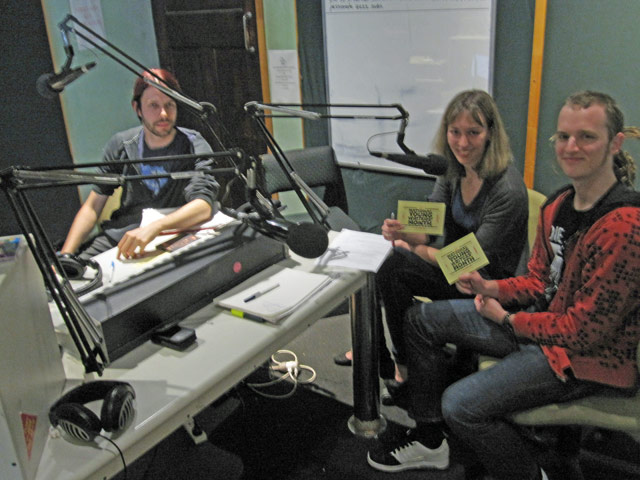
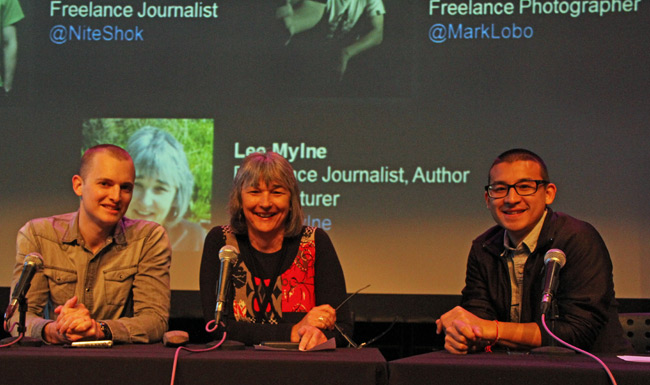
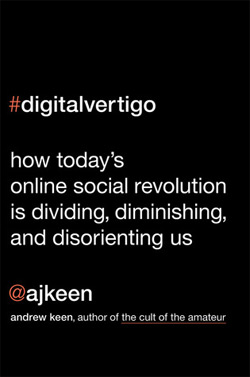 In Digital Vertigo [pictured right], Anglo-American entrepreneur Andrew Keen takes a critical stance against the technologists behind social networking tools such as Facebook and Twitter, for reasons exemplified in the book’s subtitle. Keen knows his topic from the inside: on the cover the title is presented as a Twitter hashtag and the author’s name as
In Digital Vertigo [pictured right], Anglo-American entrepreneur Andrew Keen takes a critical stance against the technologists behind social networking tools such as Facebook and Twitter, for reasons exemplified in the book’s subtitle. Keen knows his topic from the inside: on the cover the title is presented as a Twitter hashtag and the author’s name as 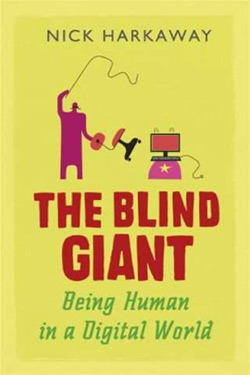 Conversely, British novelist Nick Harkaway tries his hand at long-form nonfiction for the first time in The Blind Giant [pictured right], and strikes on a narrative that immediately grips the reader. Using tight language and evocative descriptions, Harkaway’s introduction is a nightmare vision of a dystopian, tech-led society where “consciousness itself, abstracted thought and a sense of the individual as separate from the environment” are all withering away. A contrasting vision of a “happy valley” follows, and is just as realistic and compelling.
Conversely, British novelist Nick Harkaway tries his hand at long-form nonfiction for the first time in The Blind Giant [pictured right], and strikes on a narrative that immediately grips the reader. Using tight language and evocative descriptions, Harkaway’s introduction is a nightmare vision of a dystopian, tech-led society where “consciousness itself, abstracted thought and a sense of the individual as separate from the environment” are all withering away. A contrasting vision of a “happy valley” follows, and is just as realistic and compelling.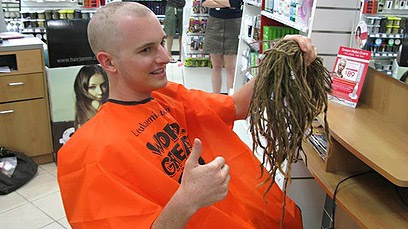
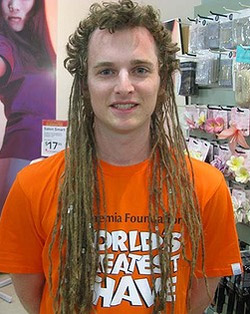 I’ve never regretted the decision, though seven and a half years of growth – coupled with the gradual thinning and breaking of the locks on top of my head – meant that it was always going to be a finite style.
I’ve never regretted the decision, though seven and a half years of growth – coupled with the gradual thinning and breaking of the locks on top of my head – meant that it was always going to be a finite style.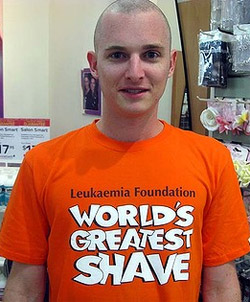 I love how hair can become a social object; a topic of conversation, a reason to interact with another human. Those with dreadlocks know this better than most. It’d surprise you just how many people are curious enough to stop us in the street and ask to touch our hair. (Just as common: “is that your real hair?”)
I love how hair can become a social object; a topic of conversation, a reason to interact with another human. Those with dreadlocks know this better than most. It’d surprise you just how many people are curious enough to stop us in the street and ask to touch our hair. (Just as common: “is that your real hair?”)
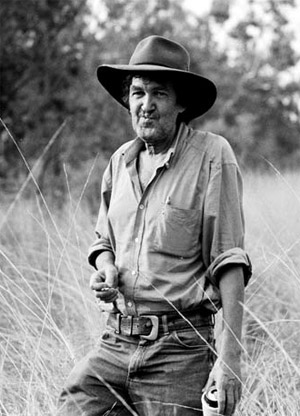 Hi Andrew,
Hi Andrew,